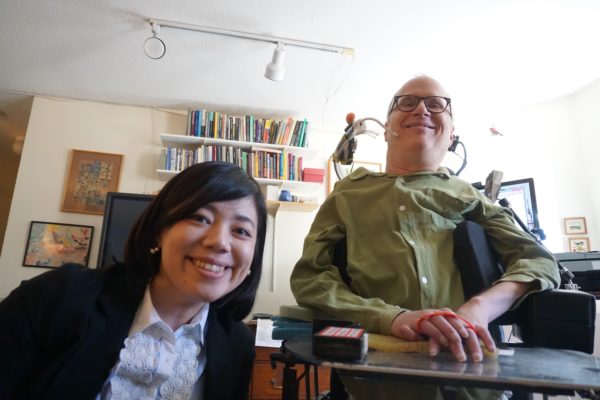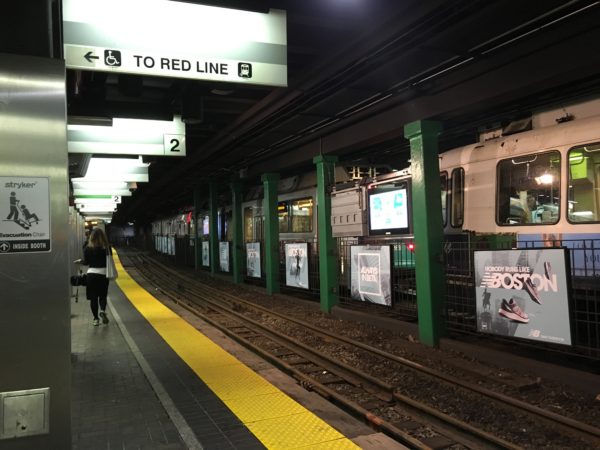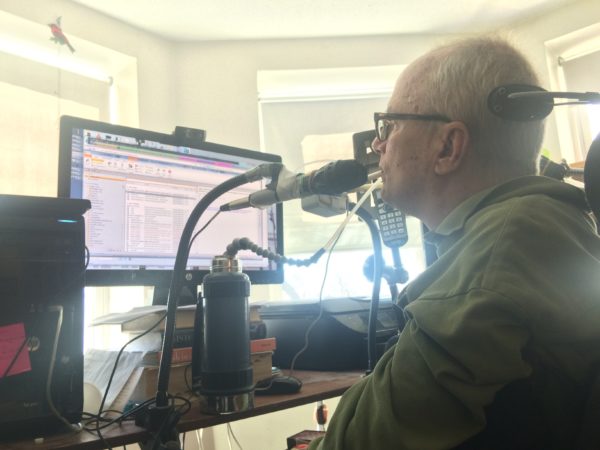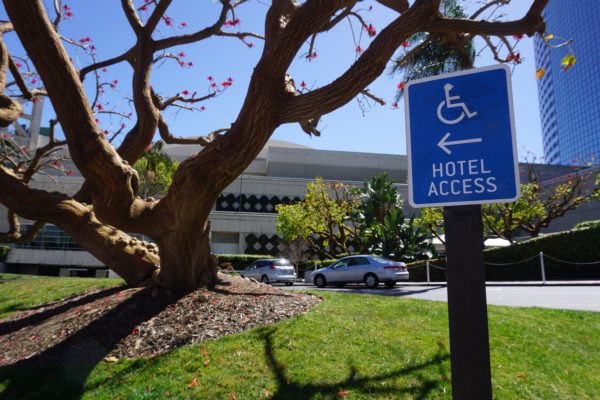この記事は次の言語でも読めます:日本語
The last person I visited was John Kelly who is a well known disability advocate in Boston. 32 years ago, he had an accident and became a quadriplegic. He was 25 years old at that time. It was a huge adjustment for him since he lived as an bodied person for a long time.

After John became disabled, he worked at the Boston Center for Independent Living (*1) for a few years, then went to graduate school to study sociology. In the 2000s, he was involved in trying to get the city of Boston to be more accessible. Boston is known as a city which is not accessible because it is an old and historic city. As I wrote previously in this blog (*2), there are many brick sidewalks and stairs to buildings which are tough to move around for Moon Riders (wheelchair users). In the US, many cities have disability commissions which coordinate advocacy for the rights of people with disabilities. John was chairman of the disability commission in Boston from 2010 to 2012. After that, he has been working as a regional director of “Not Dead Yet” which is an organization against the legalization of assisted suicide. He also has been involved in writing, media appearance, and helping Not Dead Yet activists in other states.
After I heard his very active history, I asked a question which I have been wondering for a long time.
ー Why does US have so many disability advocates?
John replied me like this.
“This is my theory. The US and UK are both societies which do not provide support to poor people and disabled people. We couldn’t get the supports we needed to live independently. Disabled people had no choice but to speak up and organize. In countries that have more generous social programs, it’s been harder to form radical, militant organizations like we have here. Also our many wars have produced many disabled veterans . In addition, American people are familiar with the language of ‘rights.” Civil rights, women’s rights, LGBTQ rights. So disability rights made sense. We have been waking each other up to make changes. For example, disability advocates helped shut down many hospitals for intellectual disabled people (*4). There have been real accessibility improvements, which don’t just benefit people in wheelchairs. Many blind people hate brick side walks because their canes get stuck and cause falls. Even if we have different disabilities, it is not hard to find someone who is also facing the same issue. By collaborating with those people and taking actions, we can make a huge change in society. “

In fact, the MBTA or “the T,” had terrible access when the Boston Center for Independent Living sued 10 years ago. Accessibility has since improved.. Before the lawsuit, often times some elevators were not working. John told me that he would check online regarding the availability of elevators before leaving home. Surely T stations and trains look very old, but many stations do not have a big gap between a platform and train. The Green Line is now the most accessible because the ramps are on the train already. One of the new accessible train cars is on almost every train. New cars have wheelchair marked buttons which a passenger can press to ask a driver to operate an automatic ramp to get in. I found that people can change the system of public transportation by working as a group with the same passion.

“It seems like the disability rights movement in the US is a generation ahead of Japan’s. I remember how things were 30 years ago, going to New York, and having a taxi driver stop and lean out the window to look at me. The only people in wheelchairs I saw were elderly people getting pushed in manual chairs. It was before the ADA (Americans with Disabilities Act). Even now, still, we have lots of pressure on cutting programs, along with smears that we are “frauds”. So I would not say that US is ahead of other countries at every point.”
John continued.
“Our main problem is not our body but the same oppression from society that you experience in Japan. Many able identified people only focus on disability and think that makes us not quite human. I hope for an ideal society in which an ethic of care is overarching, so everyone would have full confidence in their rights to be here and where everyone would contribute.”

If I compare US and Japan as the view of a person with disabilities, I would see US as more attractive. However if I talk with people with disabilities who have lived in US for a long time, I also find a darker side of society. Within Japan, this kind of gap, differences of consciousness, happens between people with disabilities and without disabilities. From the view of people without disabilities, they might be thinking that Japan has improved in accessibility a lot. However, do you think that people with disabilities also think the same way? Are they satisfied with the current environment? Even Tokyo has lots of places where cannot be accessed by people with disabilities. Some places are accessible but need someone’s help to access.
By meeting John, I have learned the importance of working together with other people with disabilities who have the same goal. By doing so, I would be able to add different perspectives to solutions and make the situation better for a wider range of users. Also, we need to make a society which is willing to listen to the voice of people with disabilities and make everything accessible to both able-bodied people and disabled people. Anyone might lose some physical function due to unexpected accident or disease. Even if no accidents or diseases hit you, everyone gets old without exception and eventually experiences hearing loss, vision loss, mobility disabilities. In an aging society like Japan, we need to improve accessibility in architecture, information, and communication. This is not for people with disabilities who live now, but for all of us who will be living in the future.
*1 Interview report of Boston Center of Independent Living
“Dignity of Risk” – Failure Helps People Grow Stronger ~Boston Center for Independent Living Part 1~
Do You Disclose Your Disability on Your Résumé? ~Boston Center for Independent Living Part 2~
*2 Boston Trip Report
*3 Terrible environment of institutions for people with intellectual disabilities became public and that was a huge news in the US. I have write about this in here.
